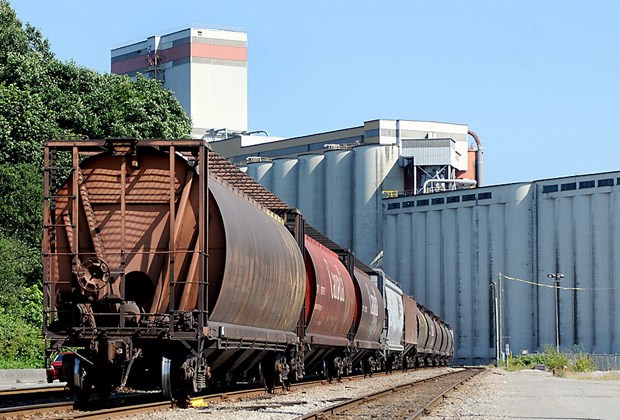Port Metro Vancouver is celebrating another record-breaking year for goods movement, thanks in large part to increased output from terminals on the North Shore.
Shipments of metallurgical coal, like the kind shipped from Neptune Terminals, was almost 26 million tonnes, about 14 per cent above last year's numbers. Potash, also shipped from Neptune, was up 20 per cent in the same period. Other bulk materials, like the grain coming from Richardson International and Cargill Canada terminals on the North Shore, was up by 10 per cent.
The growing numbers underscore the importance of the Low Level Road expansion project, which is now about half done, according to Robin Silvester, the port's chief executive officer. But the real jumps in growth will be seen after expansion projects at Richardson and Neptune are up and running.
"We're seeing some of that already with the growth in the numbers this year but I think we would expect to see the numbers grow even further when we see those two projects come into completion over the next 12 months," he said.
Neptune's new stacker reclaimer is due to come online soon and should, along with other investments to the site, increase potash capacity by 60-70 per cent and double coal export capacity.
"For Richardson, I think we're going to start seeing the silos rise up out of the ground in the not-toodistant future," he said. While the Neptune and Richardson expansion projects caught residents and council off guard, they shouldn't have come as a surprise given that the point of the Low Level Road expansion project was to increase capacity, Silvester said.
To that end, Silvester said there may be more changes in the future, including updates to the Lynnterm Westgate terminal at the foot of Mountain Highway and the largely vacant space on Low Level Road at the foot of St.
Patricks Avenue to take advantage of the growing demand for resources extracted in Western Canada, Silvester said.
"We need to make sure we have the capacity to grab that opportunity. That's all about making the best use of the land we have, so I think, over time, we will see something. There's nothing definite at the moment but we would expect to see continuing densification and increasingly efficient use of land on the North Shore," Silvester said.
The Richardson and Neptune expansions have prompted requests from residents in Moodyville, City of North Vancouver council and Vancouver Coastal Health's chief medical health officer for the port to carry out a new health impact assessment.
But, Silvester said, each expansion project has already been studied to look for potential health and environmental impacts that may come from operations, noise, dust and light. Silvester reiterated the port's previous position that no further health impact assessment would be coming.
"The products that we handle on the North Shore have been handled there for decades without any evidence at all of negative impact. Whenever a project's been brought forward, it's been studied in detail to make sure there will be no negative impact so there isn't a trigger for anything more to happen and no one should have any concern whatsoever," Silvester said.
Construction for the Low Level Road has been a nuisance and some people will permanently lose their inlet views when Richardson's new silos are complete, Silvester conceded. But North Vancouver residents will have a new road, wider bike lanes, Spirit Trail connections extending to the Lynn Creek outflow and less noise from road and trains on the other side once everything is done, he added.
"Construction work is always an inconvenience but I think, once this project is complete, people will look at it and say, 'That's actually been a big improvement,'" he said.



